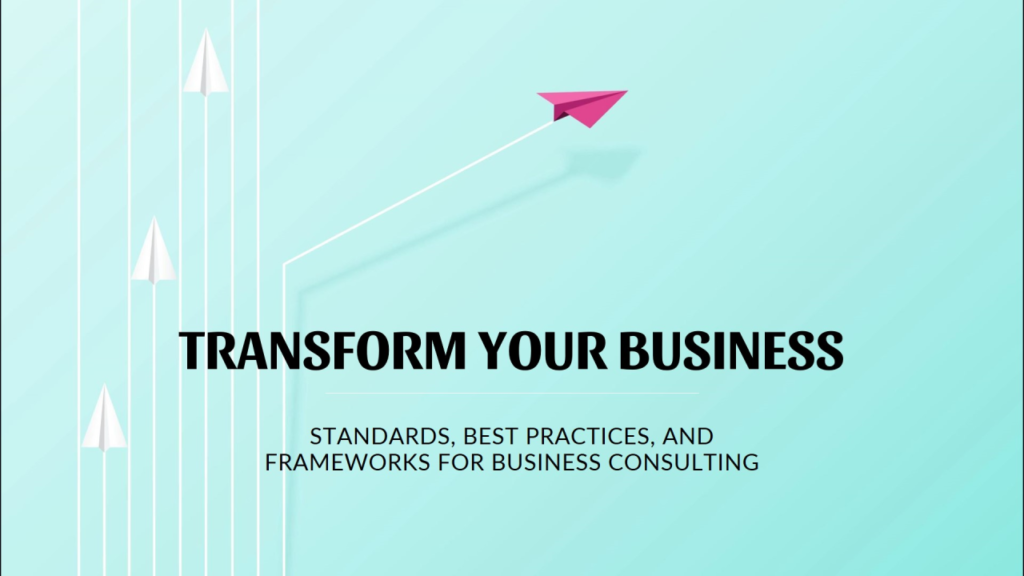
Business transformation involves strategically realigning an organization’s structure, processes, and technology to meet evolving market demands and foster sustainable growth. To ensure that transformations are effective and compliant, organizations need to follow standards, best practices, and frameworks. This structured approach helps consultants deliver consistent, efficient, and legally compliant transformation projects.
BTCaaS Consultants offers specialized services that help businesses navigate these transformations, ensuring alignment with global industry standards and compliance regulations. With their expertise, clients can seamlessly implement transformation strategies while mitigating risks and achieving measurable outcomes.
Understanding Business Transformation
Business transformation involves comprehensive organizational changes, including new leadership, technology, and operational processes. The need for transformation can stem from:
- Technological advancements (e.g., cloud, AI, automation)
- Shifts in market dynamics (e.g., customer preferences, competition)
- Regulatory changes (e.g., compliance updates)
- Operational inefficiencies (e.g., outdated workflows)
BTCaaS Consultants excels in guiding organizations through these challenges by offering tailor-made transformation roadmaps aligned with recognized standards and frameworks.
How BTCaaS Consultants Navigate Transformation with Standards and Frameworks
BTCaaS Consultants is committed to leading organizations through successful business transformations by leveraging industry-recognized standards, best practices, and frameworks. These tools ensure that transformation initiatives are consistent, compliant, and efficient. Below are some key standards and frameworks BTCaaS Consultants incorporates into their business transformation consulting approach:
1. ISO 9001 (Quality Management Systems)
- Standard: Ensures quality in management processes and services.
- BTCaaS Role: BTCaaS Consultants use ISO 9001 to design quality-focused processes, guaranteeing that the transformation aligns with both regulatory requirements and customer expectations.
2. ISO 20000 (IT Service Management)
- Standard: Provides a systematic approach to IT service management.
- BTCaaS Role: BTCaaS helps clients implement ITSM best practices during digital and IT transformations, ensuring that services remain efficient, reliable, and aligned with business objectives.
3. Lean Six Sigma (Process Improvement)
- Framework: Combines Lean’s focus on waste reduction and Six Sigma’s focus on quality.
- BTCaaS Role: BTCaaS Consultants leverage Lean Six Sigma to streamline processes, reduce waste, and enhance quality as part of continuous improvement initiatives during business transformations.
4. PMI’s PMBOK & PgMP (Project and Program Management Standards)
- Best Practice: Provides guidelines for managing complex projects and programs.
- BTCaaS Role: BTCaaS employs PMI standards to ensure transformation projects are managed with precision, from planning to execution, ensuring they stay on time, within scope, and within budget.
5. COBIT (IT Governance)
- Framework: Supports IT governance and management.
- BTCaaS Role: BTCaaS Consultants use COBIT to ensure that IT components of business transformations are effectively governed, compliant with regulations, and aligned with business strategies.
6. ITIL (IT Service Management Best Practices)
- Framework: Ensures alignment between IT services and business needs.
- BTCaaS Role: BTCaaS Consultants apply ITIL principles to optimize IT service delivery during transformations, ensuring that IT changes meet business requirements and customer expectations.
7. ISO 31000 (Risk Management)
- Standard: Provides a structured framework for managing risks.
- BTCaaS Role: BTCaaS ensures that risk management practices are integrated into every transformation project, protecting clients from potential disruptions or failures.
Ensuring Compliance with BTCaaS Consultants
In addition to industry standards and frameworks, BTCaaS Consultants ensures that all transformation projects adhere to critical compliance requirements, helping clients avoid costly penalties and reputational damage.
1. Regulatory Compliance
- BTCaaS guides clients through the complexities of regulatory compliance, ensuring that industry-specific regulations (e.g., GDPR, HIPAA) are met during transformation initiatives.
2. Financial Compliance
- BTCaaS helps businesses maintain accurate financial reporting standards such as IFRS or GAAP during financial transformations.
3. Data Security and Privacy Compliance
- BTCaaS ensures compliance with data protection regulations such as GDPR and CCPA during digital transformations, safeguarding customer data.
4. Industry-Specific Compliance
- BTCaaS Consultants navigate the unique compliance challenges faced by industries like healthcare, finance, and manufacturing, ensuring all sector-specific requirements are met.
BTCaaS Consultants: Your Partner in Business Transformation
BTCaaS Consultants stands out as a trusted partner in driving business transformation. Their approach blends best practices, global standards, and a deep understanding of industry regulations to deliver actionable solutions that result in tangible business outcomes.
By integrating recognized frameworks such as ISO, Lean Six Sigma, PMI, COBIT, and ITIL, BTCaaS helps clients mitigate risks, achieve compliance, and ensure sustainable success.
Conclusion
Successful business transformations require a structured, disciplined approach, supported by standards, best practices, and frameworks. BTCaaS Consultants empowers organizations to navigate this complexity, ensuring that transformation initiatives are not only successful but also compliant and sustainable in the long term.
